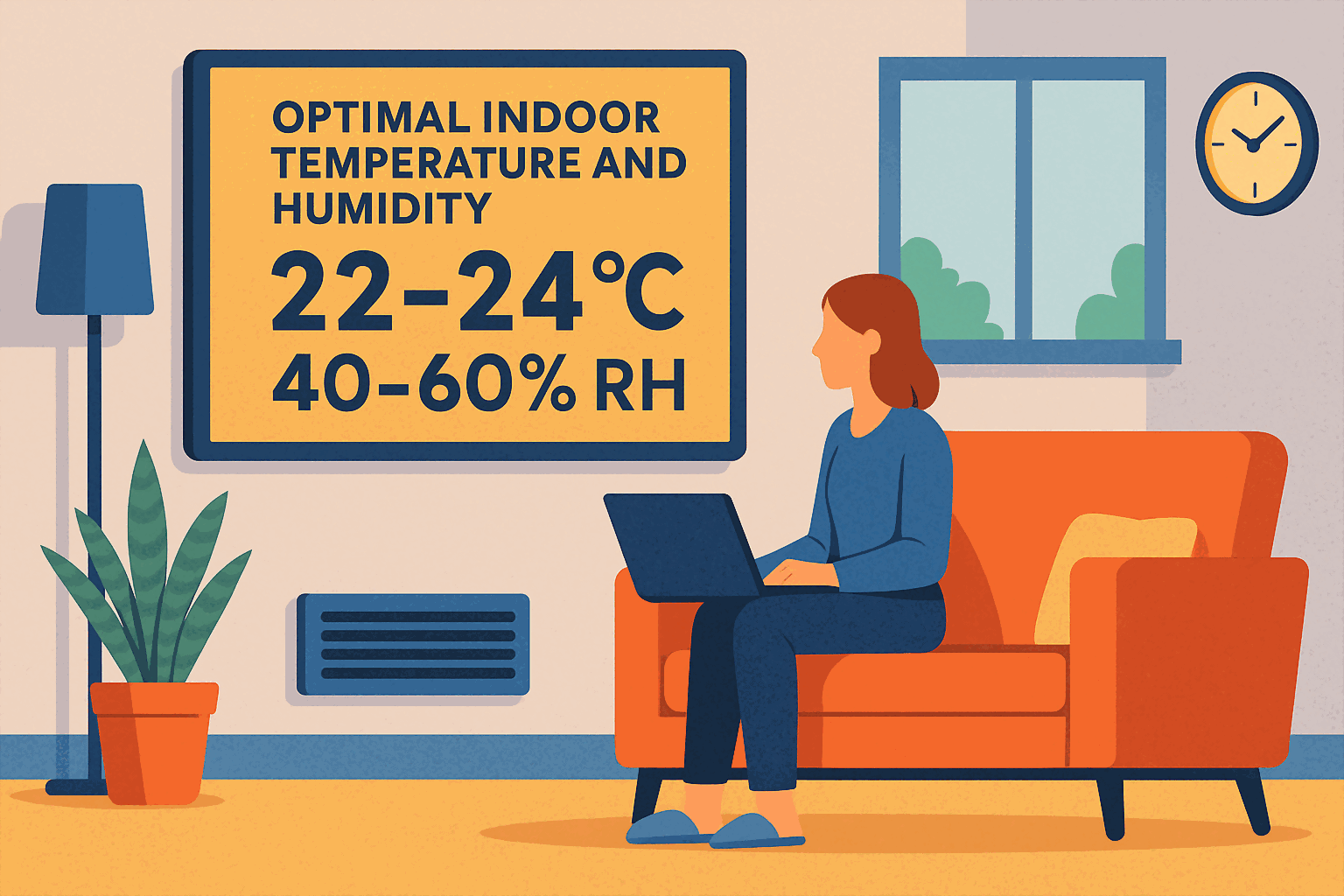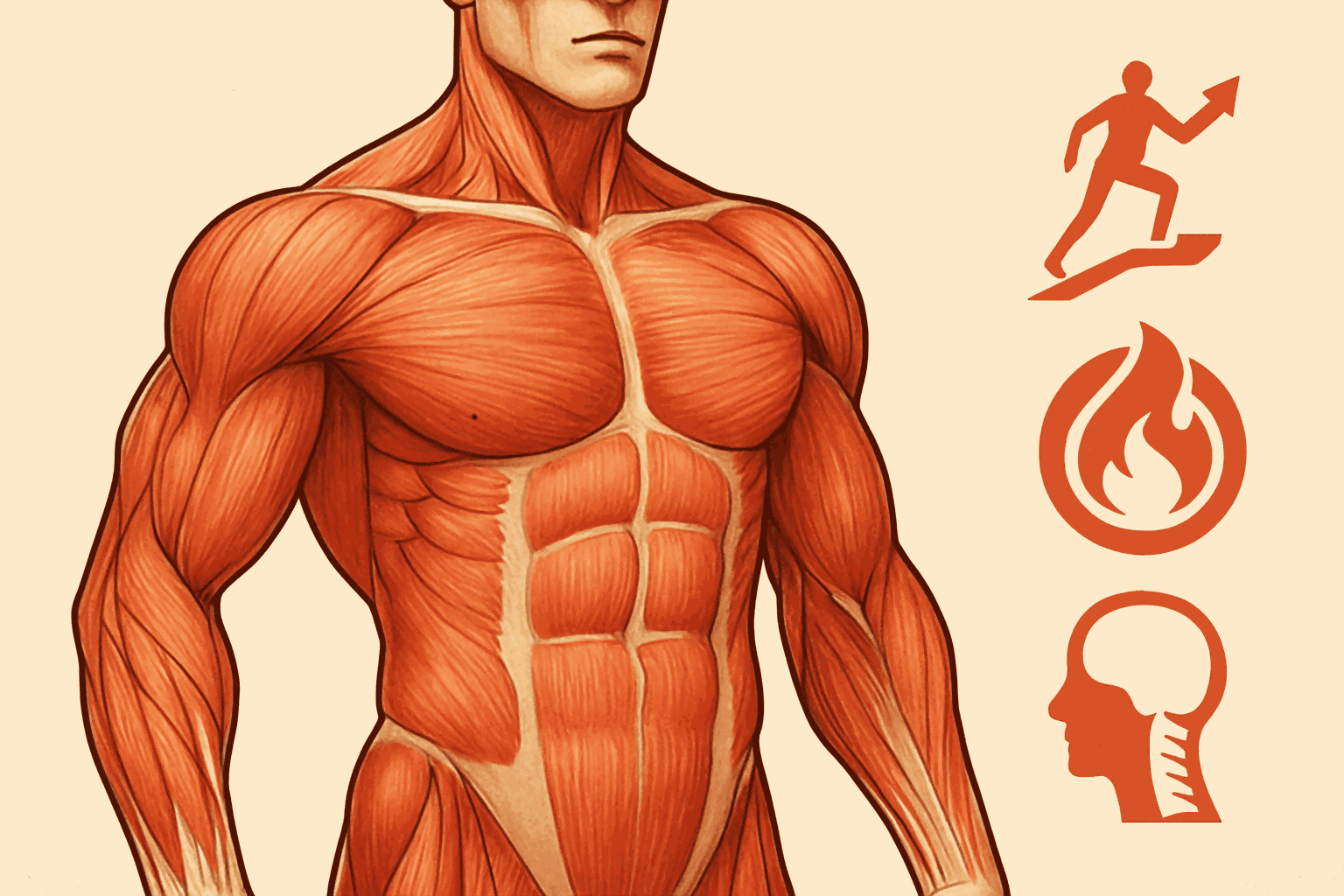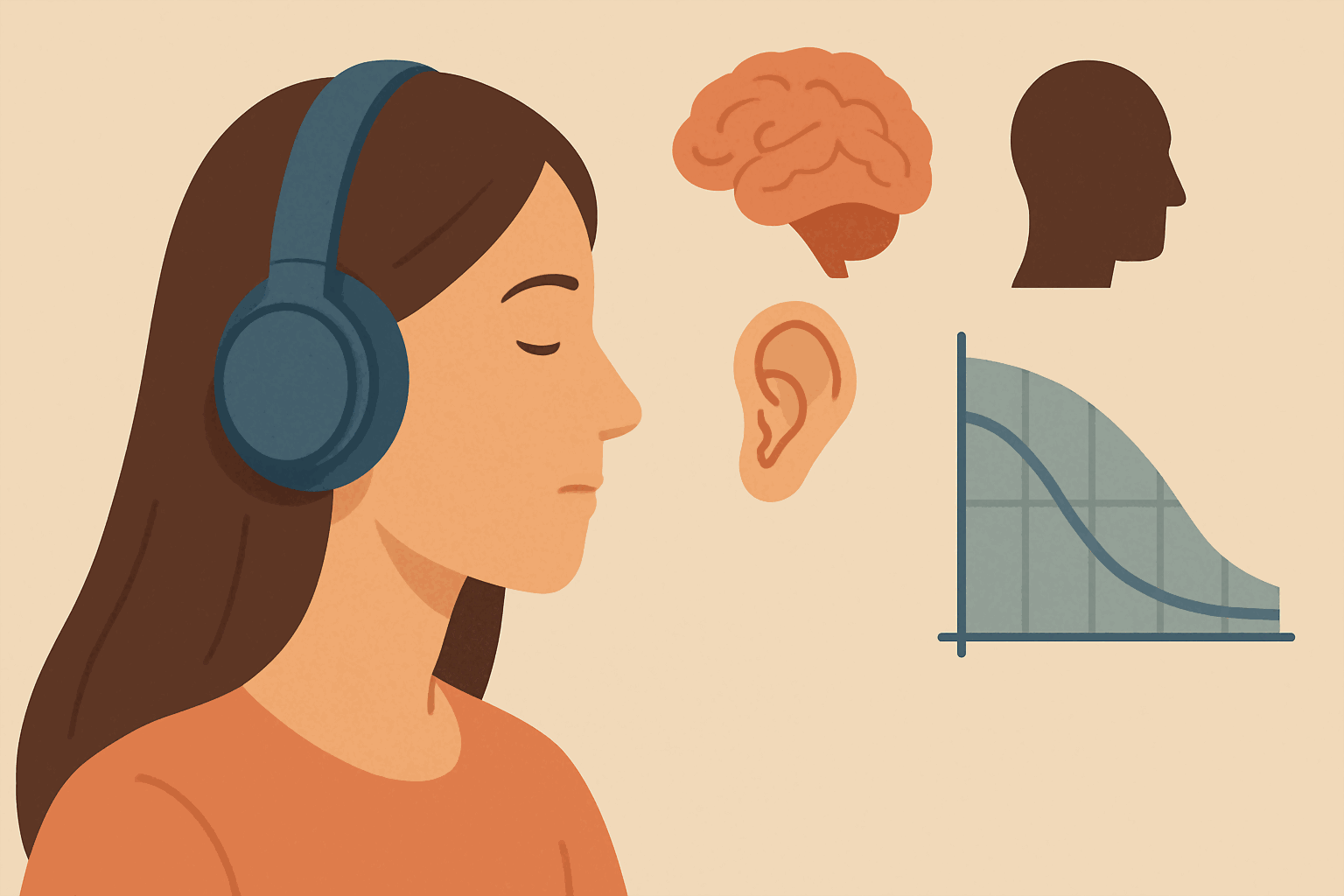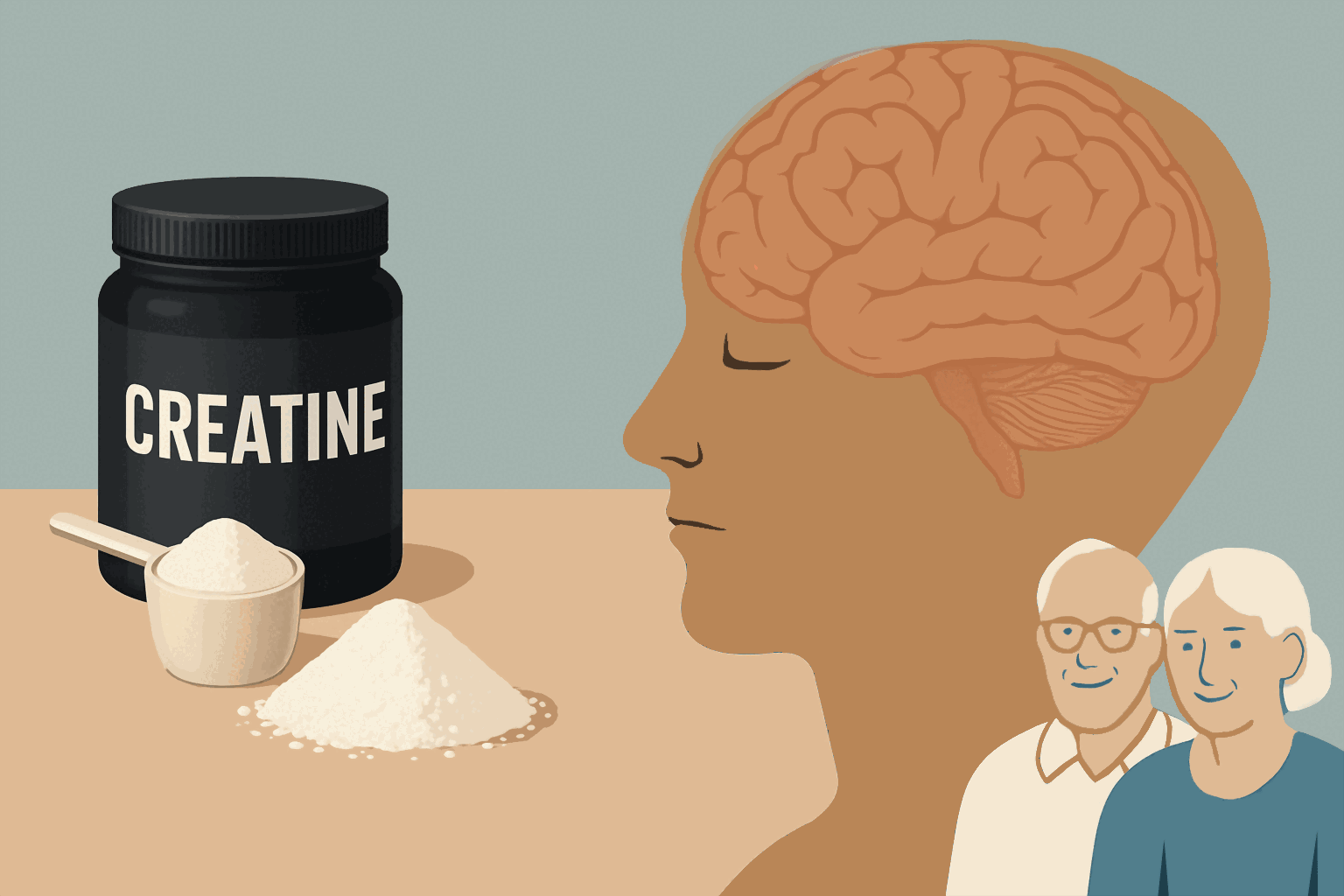
Creatine: Beyond Muscle – The Science of Brain Health, Mental Wellness, and Longevity
- Marcus Reed
- Nutrition , Supplements , Brain health , Longevity , Evidence based medicine
- May 12, 2025
Table of Contents
Fast Facts: Creatine Quick Takes
- More Than Muscle: Creatine’s benefits extend to brain energy, cognitive performance, and potentially mental wellness.
- Brain Booster: It acts as a rapid energy source for brain cells, potentially improving memory, attention, and processing speed.
- Aging Ally: Supports muscle maintenance and may benefit bone health, crucial for healthy aging and combating sarcopenia.
- Mental Wellness Potential: Early research suggests creatine might complement treatments for mood disorders like depression by supporting brain energy balance.
- Simple & Effective: Creatine monohydrate (3-5 grams daily) is the most studied, effective, and affordable form. No complex loading phase needed for long-term benefits.
- Safety Profile: Generally very safe for healthy individuals; misconceptions about hair loss and kidney damage in healthy people are largely unfounded by current evidence.
- Who Benefits Most? Effects may be more pronounced in those with lower baseline levels (e.g., older adults, vegetarians, highly stressed individuals).
Introduction: Rethinking a Fitness Staple
For decades, creatine has been synonymous with bodybuilding gyms and explosive athletic power. Its ability to enhance muscle strength and performance is undisputed, backed by hundreds of studies. But the scientific lens is widening. Emerging research, grounded in physiology and evidence-based medicine, reveals creatine’s profound potential beyond the biceps, reaching into the intricate workings of our brain, influencing mental health, and playing a role in healthy aging and longevity.
This article delves into the surprising new science of creatine, moving past the weight room to explore its impact on cognitive function, mood, age-related decline, and overall well-being. We’ll examine the evidence, address common myths with facts, and provide practical guidance on harnessing its benefits safely and effectively.
How Creatine Works: The Body’s Energy Currency
Before diving into specifics, understanding how creatine works is key. Your body naturally produces creatine, primarily in the liver, kidneys, and pancreas. It’s stored mainly in muscles (~95%) but also in the brain.
Its primary role is to help regenerate adenosine triphosphate (ATP), the main energy currency for all cells, including neurons in the brain. During high-energy demand (like intense exercise or complex mental tasks), ATP breaks down. Creatine phosphate rapidly donates its phosphate group to regenerate ATP, providing a quick energy buffer. Supplementing increases these creatine stores, enhancing this rapid energy recycling system in both muscle and brain tissue.
The Expanding Benefits of Creatine
1. Brain Health and Cognitive Enhancement
Your brain is incredibly energy-hungry. Creatine supplementation increases brain creatine levels, enhancing its energy capacity, especially during demanding cognitive tasks.
- Evidence: Multiple meta-analyses confirm that creatine supplementation can significantly improve short-term memory and measures of intelligence/reasoning [1, 2]. Effects appear stronger during stressful conditions (like sleep deprivation) or in populations with potentially lower baseline creatine levels, such as older adults and vegetarians [2]. Research also points to improvements in attention and cognitive processing speed [2].
- Potential Mechanism: By bolstering the brain’s ATP regeneration capacity, creatine helps maintain neuronal function under metabolic stress, potentially protecting against cognitive fatigue and supporting neurotransmitter systems.
2. Mental Health and Mood Support
The link between cellular energy metabolism and mental health is an active area of research. Disruptions in brain energy pathways are implicated in conditions like depression.
- Emerging Evidence: Preliminary studies suggest creatine may offer mood support. One notable study found that adding creatine (5g/day) to standard antidepressant medication (SSRIs) accelerated the response and improved remission rates in women with major depressive disorder [14]. Another indicated that creatine combined with Cognitive Behavioral Therapy (CBT) led to greater symptom reduction [3].
- Why it Might Help: By potentially restoring balance in brain energy metabolism, creatine might alleviate some bioenergetic deficits associated with depression [3]. However, more extensive research is crucial before creatine can be recommended as a standard mental health intervention.
3. Healthy Aging: Combating Osteosarcopenia
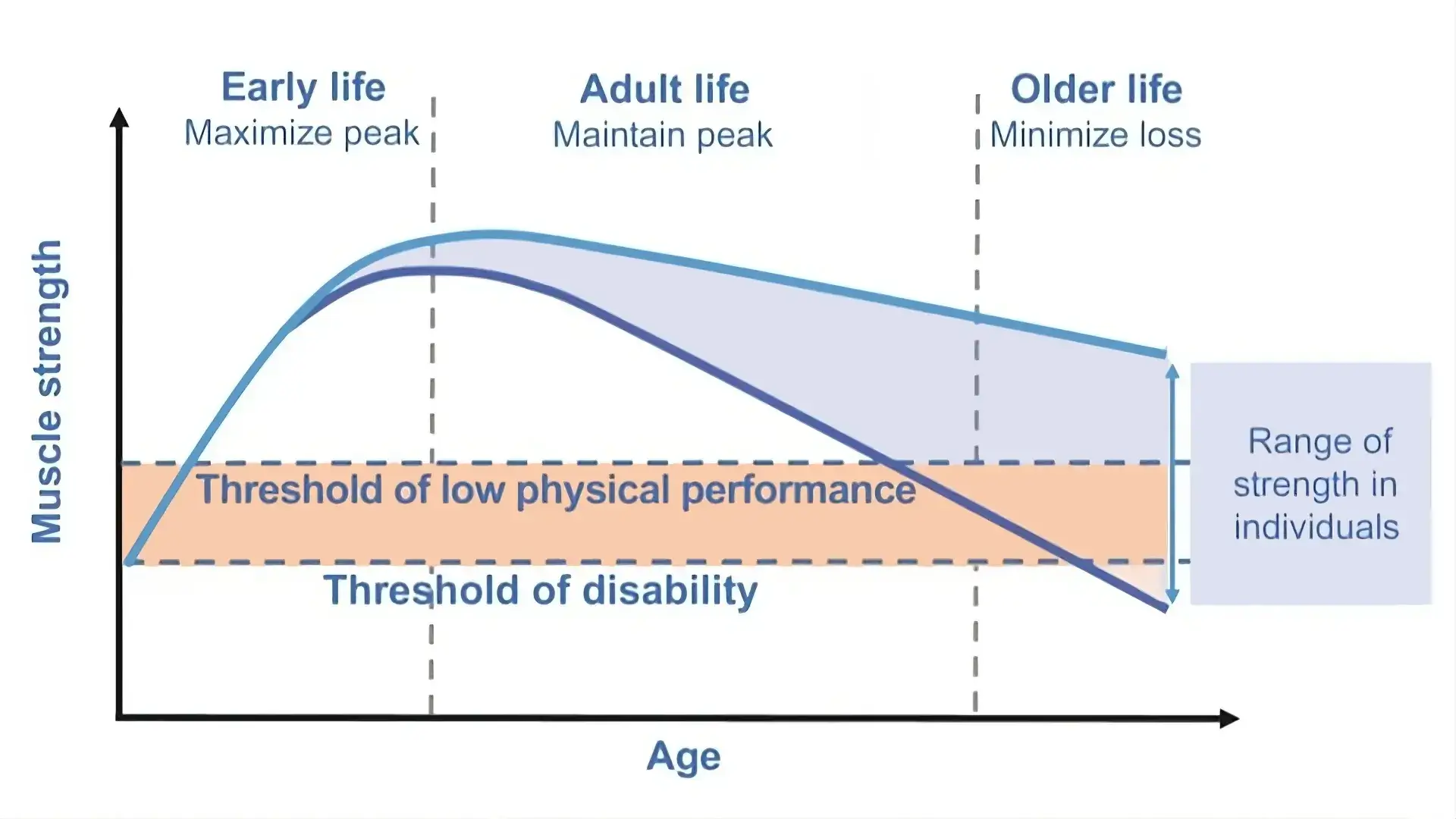
Aging often brings a decline in both muscle mass (sarcopenia) and bone density (osteopenia/osteoporosis), a combination termed osteosarcopenia. This increases frailty, fall risk, and loss of independence.
- Muscle Strength & Longevity: Muscle mass and strength are strongly linked to longevity and overall healthspan [9]. Creatine, especially when combined with resistance training, is highly effective at increasing muscle strength and lean mass, even in older adults [6, 10, 11]. Maintaining muscle throughout life is a cornerstone of healthy aging.
- Bone Health Potential: Research is exploring creatine’s role in bone health. Combined with resistance training, it may positively influence bone mineral density, potentially by enhancing the mechanical loading stimulus from stronger muscles or through direct cellular effects [5, 6]. This makes it a promising adjunct strategy against osteosarcopenia.
4. Cardiovascular Health Markers
While not its primary known benefit, some initial research suggests creatine might positively influence cardiovascular risk factors.
- Preliminary Findings: A small pilot trial in older adults showed improvements in microvascular function (blood flow) and reductions in fasting glucose and triglycerides after four weeks of creatine supplementation combined with resistance training [7]. These findings are intriguing but require confirmation through larger, dedicated studies.
Addressing Common Creatine Myths with Evidence
Despite its strong safety record [13], misconceptions persist. Let’s clarify with science:
- Myth 1: Creatine Causes Kidney Damage.
- Fact: In individuals with healthy kidney function, numerous long-term studies (up to 5 years) show creatine supplementation does not harm the kidneys [13, 16]. It does increase creatinine levels in the blood (a byproduct of creatine metabolism), which is a marker clinicians use to estimate kidney function. However, in the context of creatine supplementation in healthy people, this rise doesn’t signify kidney damage, just increased creatine turnover. Caution is advised only for those with pre-existing, significant kidney disease [13].
- Myth 2: Creatine Causes Hair Loss.
- Fact: This concern stems from a single 2009 study involving rugby players, which showed an increase in dihydrotestosterone (DHT), a hormone linked to male pattern baldness [15]. Importantly, this study did not measure actual hair loss, and its findings on DHT have not been consistently replicated in numerous subsequent studies examining creatine and hormones [13]. Changes in DHT could also be related to the resistance training itself. Currently, there is no strong scientific evidence linking creatine supplementation directly to hair loss.
- Myth 3: Creatine Causes Dehydration and Cramping.
- Fact: Controlled studies do not support this; in fact, creatine may even help maintain hydration status and reduce cramping risk, especially during exercise in the heat [13].
- Myth 4: Creatine Leads to Water Retention and Bloating.
- Fact: Creatine increases water content inside muscle cells (intracellular hydration), which is actually beneficial for muscle growth and performance. While a slight initial weight gain due to this intracellular water shift can occur, studies show long-term use doesn’t cause persistent extracellular water retention (bloating) [13]. Weight gain associated with long-term creatine use primarily reflects increased muscle mass [12].
- Myth 5: You Need to “Load” Creatine.
- Fact: A loading phase (e.g., 20g/day for 5-7 days) saturates muscle stores faster, but it’s not necessary. Taking 3-5 grams daily will achieve full saturation within 3-4 weeks and may minimize potential gastrointestinal discomfort some experience with higher doses [13].
How to Use Creatine Effectively
- Best Form: Creatine Monohydrate. It’s the most researched, proven effective, widely available, and typically the least expensive form [13]. Don’t fall for marketing hype around other forms (ethyl ester, buffered, liquid) which often lack robust evidence and cost more.
- Dosage: 3-5 grams per day. This maintenance dose is sufficient for most people to saturate and maintain elevated creatine stores [13]. Higher doses generally don’t provide added benefit once saturation is reached.
- Timing: Timing isn’t critical. Taking it consistently daily is more important than when you take it. Some prefer post-workout, potentially mixed with carbs/protein, but convenience is key.
- Mixing: Mix the powder thoroughly with sufficient water or another beverage (juice, smoothie). It doesn’t dissolve perfectly but suspending it well helps absorption.
Conclusion: A Versatile Supplement for Mind and Body
Creatine has firmly established its credentials beyond the athletic arena. The mounting evidence supporting its role in brain health, cognitive function, healthy aging, and potentially mental wellness makes it one of the most versatile and scientifically validated supplements available.
Its excellent safety profile in healthy individuals, affordability, and ease of use (simple creatine monohydrate, 3-5g daily) further enhance its appeal. Whether you’re seeking to maintain cognitive sharpness, support healthy aging, boost physical performance, or potentially complement mental health strategies (under guidance), creatine offers compelling, evidence-based benefits. As research continues to unfold, creatine stands out as a valuable tool for supporting both physical vitality and neurological resilience throughout life.
Disclaimer
The information provided on BioBrain is intended for educational purposes only and is grounded in science, common sense, and evidence-based medicine. It is not a substitute for professional medical advice, diagnosis, or treatment. Always consult a qualified healthcare provider before making significant changes to your diet, exercise routine, or overall health plan.
References
- Avgerinos, K. I., Spyrou, N., Bougioukas, K. I., Kapogiannis, D. (2018) "Effects of creatine supplementation on cognitive function of healthy individuals: A systematic review of randomized controlled trials"
- Prokopidis, K., et al. (2023) "Effects of creatine supplementation on memory in healthy individuals: a systematic review and meta-analysis of randomized controlled trials"
- Forbes, S. C., et al. (2024) "Creatine supplementation and cognitive performance: A systematic review and meta-analysis [PREPRINT]"
- Mueller, J., et al. (2024) "Creatine Supplementation for Cognitive Performance: A Systematic Review and Meta-Analysis"
- Sales, L. P., Dolan, E. (2019) "Nutrition for the Prevention and Treatment of Sarcopenic Obesity"
- Candow, D. G., et al. (2020) "Strategic Approaches to Creatine Supplementation and Resistance Training"
- Alves, C. R. R., et al. (2024) "Creatine Supplementation Associated With Resistance Training Improves Systemic Microvascular Reactivity In Older Women"
- Chami, J., Candow, D. G. (2024) "Effect of Creatine Supplementation Plus Resistance Training on Cognitive Function: A Systematic Review and Meta-Analysis"
- Volaklis, K. A., et al. (2018) "Muscular Strength as a Predictor of All-Cause Mortality in Healthy Population: A Systematic Review and Meta-Analysis"
- Chilibeck, P. D., et al. (2017) "Effect of Creatine Supplementation During Resistance Training on Lean Tissue Mass and Muscular Strength in Older Adults: A Meta-analysis"
- Forbes, S. C., et al. (2022) "Meta-Analysis Examining the Importance of Creatine Ingestion Strategies on Lean Tissue Mass and Strength in Older Adults"
- Candow, D. G., et al. (2011) "Effect of Creatine Supplementation During Resistance Training on Lean Tissue Mass and Muscular Strength in Older Adults: A Meta-analysis"
- Kreider, R. B., et al. (2017) "International Society of Sports Nutrition position stand: safety and efficacy of creatine supplementation in exercise, sport, and medicine"
- Lyoo, I. K., et al. (2012) "A randomized, double-blind placebo-controlled trial of oral creatine monohydrate augmentation for enhanced response to a selective serotonin reuptake inhibitor in women with major depressive disorder"
- van der Merwe, J., et al. (2009) "Three weeks of creatine monohydrate supplementation affects dihydrotestosterone to testosterone ratio in college-aged rugby players"
Tags :
- Creatine
- Creatine monohydrate
- Brain health
- Cognitive function
- Longevity
- Healthy aging
- Mental health
- Depression
- Supplements
- Evidence based
- Sarcopenia
